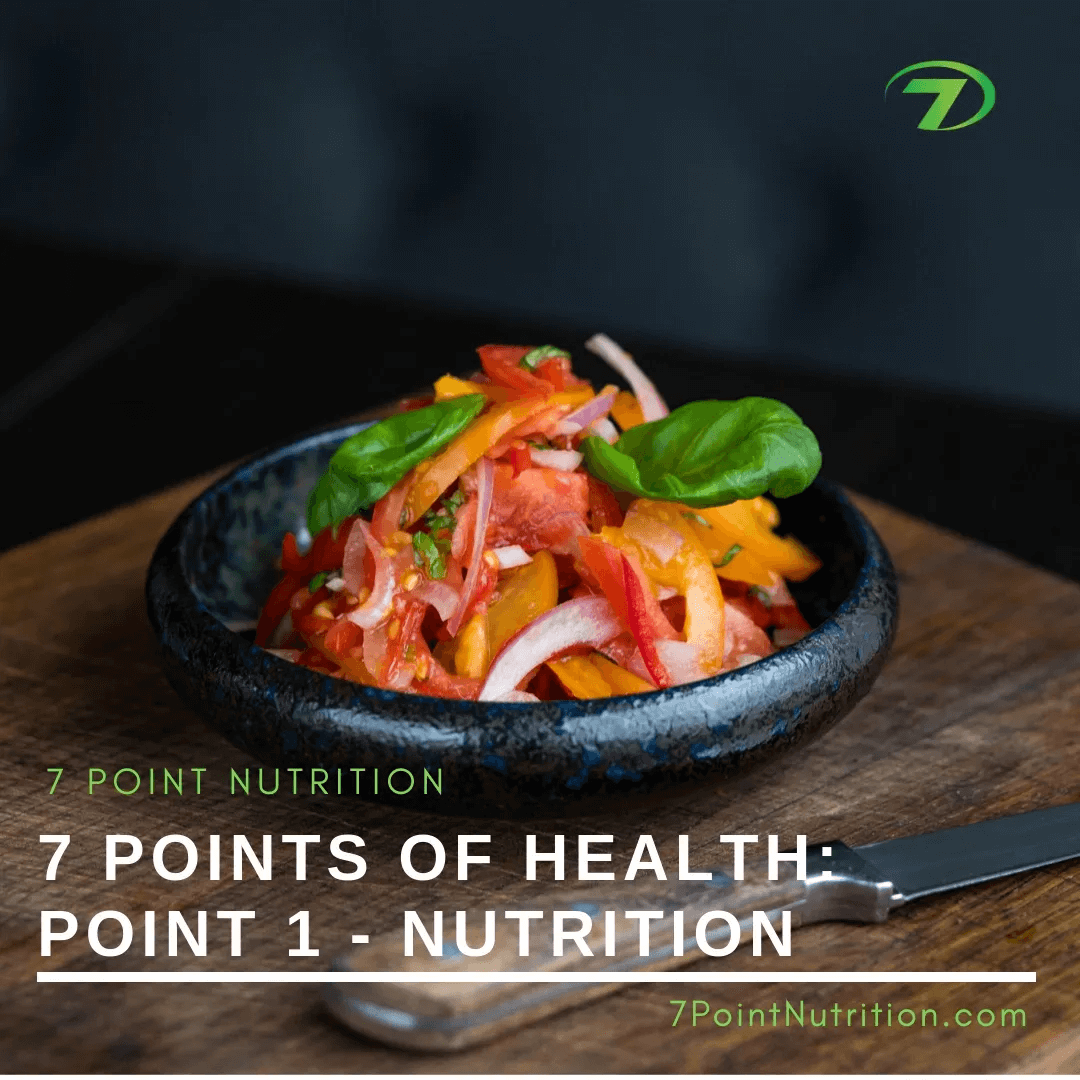Point #1 Nutrition
At 7 Point Nutrition, we center our Nutrition Programs around the individual, using their unique situation while bringing balance to what we believe are the most important 7 Points of Health:

1) Nutrition
2) Supplementation
3) Hydration
4) Sleep
5) Exercise
6) Hormones
7) Support System
We have always believed in having an overall balance in all aspects of life. Over the next 7 weeks, we will dive deeper into each of these Points, today starting with Nutrition.

This topic is very broad, and can be very confusing, and as such we?ll lay out some easy to understand basics. An easy way to prioritize nutrition tasks is by putting things into a hierarchy:
1) Calorie balance – is priority number one. It?s a calorie equation first and foremost. You must be in a surplus to gain weight, a deficit to lose weight and obviously eating at maintenance for weight to stay the same. It?s important to calculate proper calorie amounts and make proper adjustments.
- Calculate your BMR http://www.bmi-calculator.net/bmr-calculator/, estimate calories burned from both exercise and non exercise activities during the day, and add these numbers up to get your total daily energy expenditure (TDEE). (We use the InBody scale in our stores to get a more accurate, personalized analysis of this.)
- Losing 1 lb of fat in a week requires a calorie deficit of 500 calories per day. Meaning your daily calorie intake would be 500 calories less than your TDEE to achieve this. Calculate your daily needs appropriately knowing that it?s best to shoot for a fat loss of 1-2 lbs per week, or 0.5-1% of your body weight.
2) Macronutrients – Protein, carbs, and fats. How you break up your calories is of next importance. You must eat a proper amount of each macronutrient.
- Protein – Protein provides the building blocks for muscle growth and supplies amino acids necessary to prevent muscle breakdown. Research shows a protein intake of around 1 gram per pound of lean body mass is sufficient for muscle gain and/or retention.
- Carbohydrates – the major source of energy in the body.The primary fuel in the body for muscle performance is a stored form of carbohydrate called glycogen. Carbs are also the preferred form of energy for the nervous system.
- Fats – helps the body absorb vitamins, helps with brain activity, controls inflammation and regulates hormones. Research shows the minimum intake for sustained fat intake should be around 30% in grams per pound of lean body mass. So if you have 120 lbs of lean body mass, your fat intake should be around 36 grams. Fat intake below this amount for long periods of time can negatively impact hormones.
3) Nutrient timing – simply when to get your food in. Meals every 3-5 hours is optimal, especially due to the fact that there is no mechanism in the body to store protein. Proper pre and post workout nutrition can be important as well. In most cases it?s appropriate to split your macronutrient intake equally between meals.
4) Food composition – the type of protein, carbs and fats that make up your diet. Protein quality is higher in animal sources, such as meat, eggs, dairy, etc. and lower in plant sources. Carbs should generally be consumed from complex carb sources, such as brown rice, quinoa, potatoes, etc. and from healthy simple carbs, like fruits and vegetables. The majority of fats should be consumed from monounsaturated sources, such as avocado, nuts, olive oil, etc.
5) Supplements – supplements can be helpful in rectifying deficiencies, filling in gaps in your nutrition and also provide convenient healthy options. We will discuss supplements more in depth in a future article in our 7 Points of Health series, so stay tuned.
Use this hierarchy to help you to organize a well balanced approach to your nutrition. Creating a well balanced sustainable approach to fit a busy lifestyle can be difficult. To see how we can help you achieve your goals, set up a free consult with us today, and feel free to contact us with any questions that you may have.
by
Derek Reasch – NASM Certified Fitness Nutrition Specialist, 7 Point Nutrition Coach 435-621-5465
7 Point Nutrition
Check out all our Coaches and schedule your free consultation here
Info@7PointNutrition.com
7 Point Nutrition does not claim to diagnose, treat or prevent any diseases or medical conditions. Always consult a physician for any medical conditions or health concerns you have and before starting any diet, exercise or supplement program.
About the author